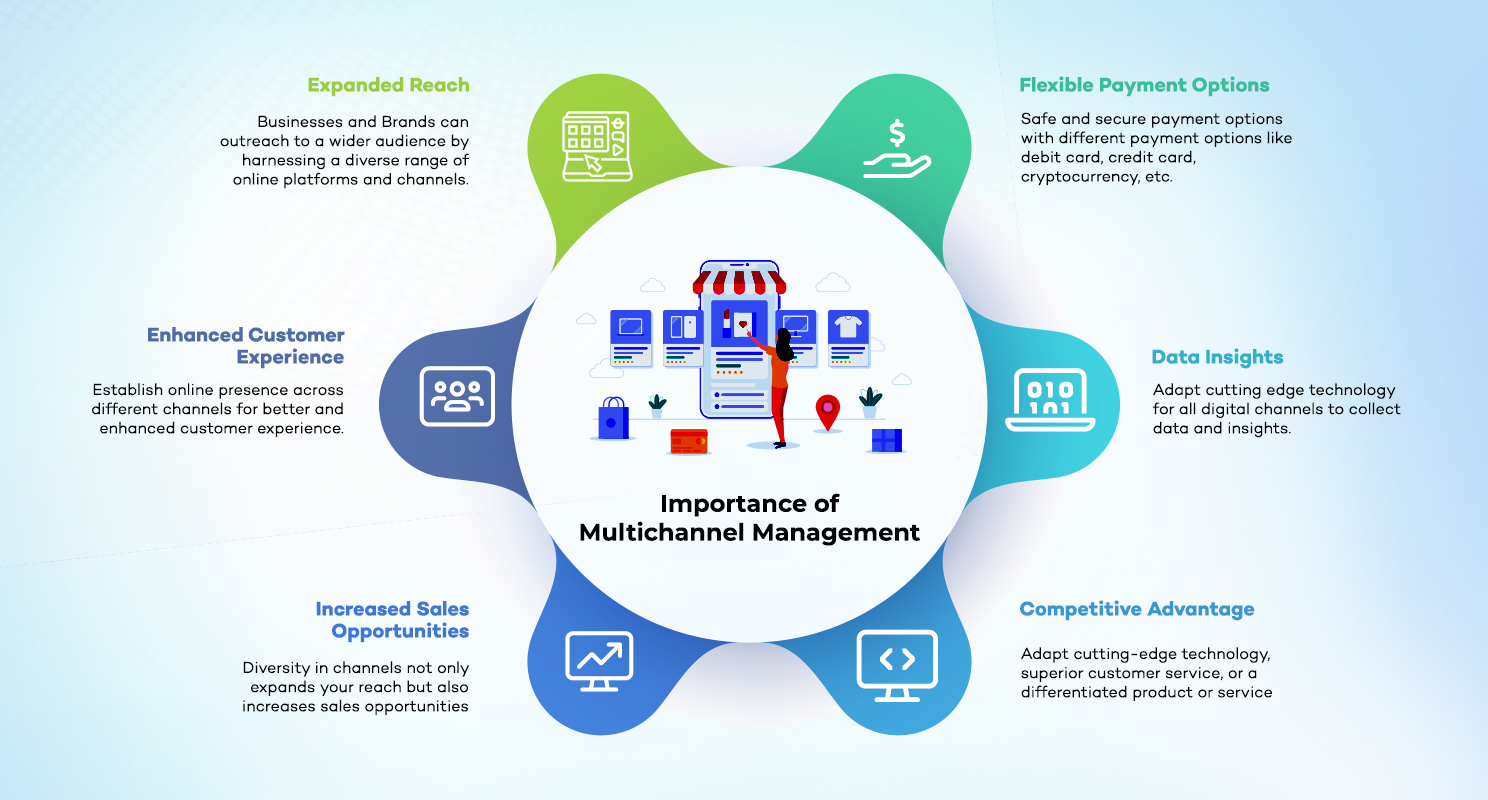The world of retail has undergone a seismic shift. eCommerce has become the cornerstone of shopping, and consumers now have a multitude of channels at their fingertips to make purchases. From online marketplaces and social media platforms to headless websites, the choices are endless.
According to Zipdo, businesses that adopt a multichannel management marketing strategy experience a 91% higher yearly customer retention rate. Apart from this, 95% of the marketers say that their multichannel marketing efforts have a significant impact on their business.
For retailers, this presents both opportunities and challenges. While the vast reach of the internet allows them to connect with a global audience, it also means navigating a complex landscape of platforms and channels. This is where multichannel management comes into play.
In this article, we'll explore why multichannel management has become a crucial factor for retailers striving for success in the world of ecommerce.
What Is Multichannel Management?
Multichannel management is a strategic approach employed by retailers and businesses operating in the digital realm to effectively market and sell their products or services across multiple online channels, platforms, and touchpoints. These channels can include e-commerce websites, social media platforms, online marketplaces, mobile apps, email marketing, and more.
At its core, multichannel management seeks to streamline and harmonize the customer experience across all these diverse channels. It involves coordinating product listings, inventory management, pricing, and marketing efforts to ensure consistency and coherence. This consistency helps build trust and recognition among customers, enhancing brand loyalty and satisfaction.
What Makes Multichannel Management Important?
It is true that the importance of multichannel management for retailers cannot be overstated. Here are some compelling reasons that make it crucial for your ecommerce business:
1) Expanded Reach
Through multichannel management, businesses can extend their outreach to a wider audience by harnessing a diverse range of online platforms and channels.
As an illustration, an e-commerce retailer can market and sell its products not only through its website but also on well-established online marketplaces such as Amazon and eBay.
This strategic approach broadens the business's access to millions of potential customers who favour these platforms, consequently boosting the chances of generating sales and enhancing brand visibility.
2) Enhanced Customer Experience
Customers today value convenience and flexibility in their shopping experiences. Multichannel management caters to these preferences by offering multiple ways to shop.
Whether a customer prefers to browse products on a website, make purchases via a mobile app, or discover new items through social media, businesses can accommodate their needs. This enhances customer satisfaction and businesses are able to get repeat business.
Furthermore, customer convenience is a fundamental concept in modern business, encompassing a range of strategies and practices aimed at simplifying the shopping experience for consumers.
It starts with providing accessible shopping channels, including e-commerce websites, mobile apps, and physical stores, so customers can choose the most convenient option for them.
User-friendly interfaces with intuitive layouts and search functionalities make it easy for customers to find products quickly.
Flexible payment options, robust product information, and personalized recommendations further enhance the shopping experience by offering convenience and confidence in decision-making.
3) Increased Sales Opportunities
Increased sales opportunities are a critical outcome of effective multichannel management. By diversifying the avenues through which products or services are offered, businesses open the door to a wider array of potential customers.
Each sales channel, whether it's a dedicated e-commerce website, a presence on popular marketplaces, or a strategic social media presence, represents a unique avenue for reaching and engaging with distinct customer segments.
This diversity in channels not only expands the reach but also allows businesses to tailor their sales strategies to suit the preferences and behaviours of customers on each platform.
As a result, businesses can tap into new markets, capture niche audiences, and seize opportunities that may have otherwise gone untapped, ultimately driving revenue growth and enhancing their overall market position.
Multichannel management seeks to streamline and harmonize the customer experience across all these diverse channels.
4) Flexible Payment Options
Flexible payment options encompass a comprehensive range of choices that businesses provide to customers during the checkout process.
This customer-centric approach acknowledges the diverse financial preferences, security concerns, and comfort levels customers have with various payment methods.
Businesses offering flexible payment options typically accept major credit and debit cards, digital wallets like PayPal and Apple Pay, bank transfers, and alternative payment methods like buy-now-pay-later services and cryptocurrencies.
Instalment plans and cash-on-delivery options may also be available, tailoring the payment experience to different customer needs.
Furthermore, international payment methods and guest checkout options are considered, especially for businesses with a global clientele. Security measures such as SSL encryption and fraud detection are crucial to ensure the safety of customer payment data.
By providing this flexibility, businesses not only enhance the shopping experience but also reduce cart abandonment rates, increase sales, and demonstrate a commitment to meeting their customers' preferences and needs.
5) Data Insights
Data insights, in the realm of business, represent the invaluable knowledge and understanding derived from the analysis of vast sets of data. This process involves collecting, organizing, and examining data to uncover trends, patterns, and actionable information that can drive informed decision-making.
In today's data-driven landscape, businesses harness data insights to gain a competitive edge. Through the examination of customer behaviour, market trends, operational efficiency, and more, data insights empower organizations to make strategic choices that optimize performance, enhance customer experiences, and seize new opportunities.
Moreover, data insights are instrumental in personalizing marketing campaigns, improving product offerings, and predicting future trends, ensuring that businesses stay agile and responsive in an ever-evolving marketplace.
6) Competitive Advantage
Competitive advantage is the cornerstone of success in the business world, representing the unique strengths and strategies that set a company apart from its rivals.
It encompasses a combination of factors, including innovation, quality, cost-efficiency, brand reputation, and customer-centricity, that collectively position a business ahead of its competitors.
Achieving a competitive advantage allows a company to outperform its peers, capture market share, and sustain long-term profitability.
Whether through cutting-edge technology, superior customer service, or a differentiated product or service offering, businesses constantly strive to identify and leverage their competitive advantages to thrive in today's dynamic and competitive marketplace.
Implementing a Successful Multichannel Strategy for 2024
For a successful multichannel strategy, certain key pointers need to be kept in mind. Some of them are:
Who’s Your Target Audience
The first and the most important thing is to identify your customers. It is important for your business to know who are you trying to reach with your marketing campaigns.
Once you are well-versed with your targeted audience, you can streamline your channels and messages accordingly.
Choosing the Right Channel
In eCommerce business choosing the right channel is the utmost important thing. Not every channel is meant for your business. Some channels are better suited for certain types of businesses or users.
Create Personalized Messages
In the current competitive market, we have analysed the shopping experiences of customers. It has been noticed that they are more likely to engage with the messages that are more appropriate and relevant to them.
You can make use of personalized data to create appropriate and personalized messages for your customers for different channels.
Track and measure your Result
Only investing and implementing on multichannel is not your final task. As a business owner, you must have a track of all your multichannel marketing campaign results to see what all things are working for your business and what not.
This will not only help you to streamline your process but also you can optimize your campaigns over time.
Important Multichannel Management Tools to Make Your eCommerce Business Skyrocket
Product Information Management System
Multichannel management tools, particularly Product Information Management (PIM) systems, serve as powerful catalysts for business growth.
PIM systems centralize and streamline product data management to ensure accuracy and consistency across multiple sales channels. This leads to better customer experiences and fewer errors.
These tools allow businesses to launch new products or update existing ones across multiple channels quickly, improving time-to market efficiency.
PIM systems improve data accuracy with their data validation and quality controls. They also segment and organize the data to facilitate personalized marketing campaigns. Businesses can then create targeted marketing campaigns, increase conversion rates and foster customer loyalty.
PIM also offers valuable insights via analytics that can be used to make strategic decisions. These tools are essential for businesses that want to succeed in the multichannel landscape. They offer scalability and cost-efficiency while also providing a competitive edge.
Inventory Management Software
IMS centralizes inventory data and provides a real-time overview of stock levels in various locations, warehouses and sales channels. This visibility allows businesses to make informed decisions and avoid stockouts or overstocking. It also reduces carrying costs. They are often integrated with ecommerce platforms. This ensures accurate product availability and reduces the risk of excessive selling. It not only increases customer satisfaction, but also allows businesses to capture more sales.
Apart from this, IMS tools offer demand forecasting capabilities, allowing companies to anticipate market trends and customer preferences, and enable proactive inventory management. Cost efficiencies are realized through reduced holding costs and more precise procurement, ultimately contributing to profitability.
Thus, multichannel management tools like Inventory Management Systems provide businesses with the flexibility to agile, control, and data-driven insights necessary to expand their operations, improve customer experiences, and achieve sustainable growth in a competitive marketplace.
Comparison Shopping Engine Feeds
When integrated into multichannel systems, comparison engine feeds are a vital component that enhances a company's multichannel strategies. These feeds provide a centralized platform for managing and disseminating product data across online marketplaces and comparison shopping engines. This includes descriptions, images and pricing.
Comparison Engine feeds provide unified information about products, which ensures consistency and accuracy in all channels. This reduces errors and discrepancies, which could negatively impact customer experience.
Integrating Comparison Engine feeds with multichannel management not only saves resources and time, but also gives businesses a competitive edge by enabling them to present their product consistently and effectively on multiple channels. This puts them on the path to success in a multichannel commerce environment that is competitive.
Customer Support Tools
As you are into your eCommerce business, customer satisfaction becomes one important factor to make it successful. There may be a scenario where you get multiple emails, chats, and messages from thousands of customers and giving them a reply is not possible in one shot.
Through your multichannel management system, you can integrate customer support tools and reply to the emails, chats, and messages under one single dashboard.
Customers are human too and each one of them deserves valued and heard. Through customer support tools you can feel them valued and heard.
Wrapping Up
As we are moving towards 2024, multichannel marketing is becoming an essential part of any successful marketing strategy. It stands true that multichannel marketing is the future of both B2B and B2C marketing.
By using a variety of channels, it becomes possible for your customers to create a more personalized and engaging shopping experience. A customer engagement platform can help you achieve all your marketing campaigns more effectively and efficiently.
Thus, if you’re struggling with your business and want the right move in 2024, multichannel management can be the best choice for you.



.png?h=630&fm=webp)




.png?h=250&fm=webp)
.png?h=250&fm=webp)
.png?h=250&fm=webp)



.png?h=250&fm=webp)
.png?h=250&fm=webp)
.png?h=250&fm=webp)


.png?h=250&fm=webp)



.png?h=250&fm=webp)
















.png?h=250&fm=webp)

.png?h=250&fm=webp)
.png?h=250&fm=webp)



































































































































.png?h=250&fm=webp)


.jpg?h=250&fm=webp)





 copy.png?h=250&fm=webp)























_ Why do you need one.png?h=250&fm=webp)


























































.jpg?h=250&fm=webp)

.png?h=250&fm=webp)



.png?h=250&fm=webp)

.jpg?h=250&fm=webp)




.png?h=250&fm=webp)









.jpg?h=250&fm=webp)
